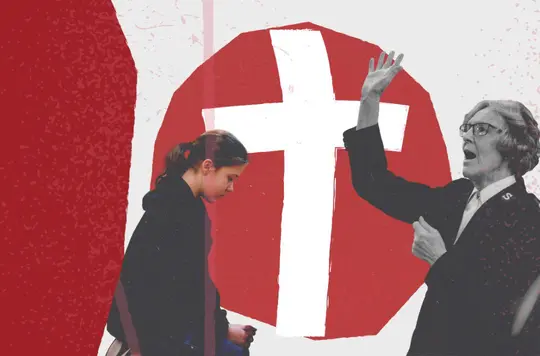5 April 2025
Mark 14: Jesus is denied
Captain Callum McKenna
There are lessons to be learnt in the school of scandal, writes Captain Callum McKenna.
Key texts
My wife, Berri, and I were making dinner in the kitchen while our two boys – aged four and one – were happily playing together in the next room. After a short while, we noticed an eerie silence had descended and so decided to check on how their playing was going. There was felt-tip pen on the wall, felt-tip pen on the chairs and felt-tip pen on our youngest son’s face but, despite all the evidence to the contrary, our eldest exclaimed the famous words: ‘It wasn’t me!’
Pause and reflect
- Can you think of a time in your life when you tried to abdicate responsibility for something you did or failed to do?
I don’t know if you’ve ever had a meal with someone where it felt a bit uncomfortable, like there was an elephant in the room that nobody wanted to address. Our study passage begins at the Last Supper. Jesus and his disciples are sharing the Passover meal, and there’s a tense atmosphere. As they eat, Jesus reveals that one of them will deny him. Later, as the meal wraps up, Jesus brings up betrayal again, telling the disciples that, while one may betray him, all will ‘fall away’ (v27). At this point, Peter loudly declares: ‘Even if they all fall away, I will not!’ (v29 New English Translation).
This is Peter’s first denial. Peter denies the possibility of getting it wrong. It’s a common mistake that humans – and, indeed, followers of Jesus – make. The Greek word Mark uses for ‘fall away’ is skandalizō, and it’s easy to spot the link to the English word ‘scandal’. The thing about scandals is that those who get caught up in them very rarely intend to do so.
When we think of the scandals that play themselves out in the media, we often see that those at the centre of them have played fast and loose with the rules, thinking they could dodge scrutiny or accountability without getting caught.
In essence, this is Peter’s mistake. He thinks that, while everyone else is susceptible to a scandal, he’s above it. That’s a mistake we’re prone to when we fail to own our own frailties, when we adopt a holier-than-thou approach, and when we neglect to keep on growing in Christlikeness.
Pause and reflect
- What spiritual practices or disciplines could you engage in to help keep you from falling?
As the story progresses, just as predicted, Peter indeed falls away. This encounter makes for uncomfortable reading as he spirals downward, denying Jesus three times. A servant-girl of the high priest challenges Peter: ‘You also were with that Nazarene, Jesus’ (v67). Then she declares to bystanders: ‘This fellow is one of them’ (v69).
Peter denies her accusations. Finally, in exasperation, Peter calls down curses and swears to them: ‘I don’t know this man you’re talking about’ (v71). In doing so, Peter not only denies his association with Jesus but also shows that he’s missed the point of Jesus’ message about the cost of discipleship, which appears throughout Mark’s Gospel. By denying Jesus, Peter forgets that following Christ requires him to deny himself (see Mark 8:34).
It’s this truth that’s at the heart of our Lenten journey. Travelling the road to Calvary means walking faithfully in Christ’s way and denying our natural instinct for self-preservation. German theologian Dietrich Bonhoeffer expressed this in The Cost of Discipleship, writing: ‘To deny oneself is to be aware only of Christ and no more of self, to see only him who goes before and no more the road which is too hard for us. Once more, all that self-denial can say is: “He leads the way, keep close to him.”’
Bonhoeffer highlights the two sides of self-denial – letting go of ego, pride, plans and ambitions while following the one who is entirely faithful and offers fullness of life. This is discipleship – a costly paradox Bonhoeffer would face first-hand when he was imprisoned and later executed in Flossenbürg concentration camp in 1945.
Pause and reflect
- What does the ‘cost of discipleship’ look like in your life?
The story ends with a despairing and anguished Peter. Feeling the pangs and pains of his denial, Mark tells us that Peter ‘broke down and wept’ (v72).
This is yet another uncomfortable tension in this story. At first glance, it’s not one that Mark resolves in his Gospel; there’s no mention of a post-Resurrection reinstatement on the beach. Yet, the clue to what Jesus makes of Peter’s denial is to be found back in verse 28 of our study passage.
Jesus tells the disciples they’ll fall away. However, after the Resurrection, he will go ahead of them to Galilee. In the same breath, Jesus predicts Peter’s denial and affirms that there’s still a purpose and a place for him. It’s almost as if Jesus had factored in Peter’s failings from the start.
I guess this might bring a great sense of relief to those of us who try to follow Jesus today. Our failings are factored in. Our mistakes are redeemable. Our sense of calling does not depend on our reliability or faithfulness, rather on the reliability and faithfulness of the one who goes ahead of us. Maybe, this Lent, you’ll be able to join with this prayer of Peter imagined by General John Gowans and say:
Knowing my failings, knowing my fears,
Seeing my sorrow, drying my tears.
Jesus recall me, me re-ordain;
You know I love you, use me again.
You know I love you, use me again.
(SASB 715)
Bible study by

Captain Callum McKenna
Mission and Ministry Formation Coordinator, William Booth College
Discover more

Join the personal discipleship challenge and complete 40 daily acts of courage this Lent.

Resources to help transform our hearts this Lent, including material for Palm Sunday.

Devotions, articles and resources to help you journey through Lent and celebrate Easter.

Ivan Radford explores portrayals of Jesus and the events of Easter on film and TV.
